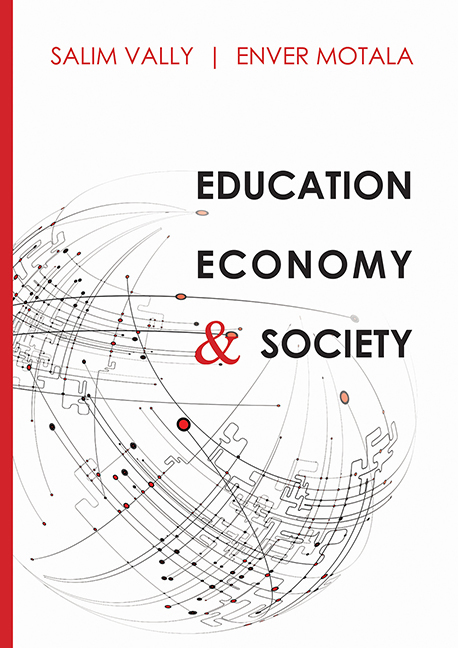Book contents
- Frontmatter
- Contents
- Foreword
- Preface
- About the contributors
- Acknowledgements
- Abbreviations and acronyms
- Chapter 1 ‘NO ONE TO BLAME BUT THEMSELVES’: Rethinking the Relationship between Education, Skills and Employment
- Chapter 2 EDUCATION AND ECONOMY: Demystifying the Skills Discourse
- Chapter 3 UNIVERSITIES AND THE ‘KNOWLEDGE ECONOMY’
- Chapter 4 GOING AROUND IN CIRCLES: Employability, Responsiveness, and the Reform of the College Sector
- Chapter 5 BUILDING A TRANSFORMATIVE PEDAGOGY in Vocational Education
- Chapter 6 SKILLS? WHAT SKILLS? JOBS? WHAT JOBS? An Overview of Research into Education/Labour Market Relationships
- Chapter 7 DEBATING THE NEXUS of Education, Skills and Technology in the Age of Lean Production: A Case Study of the ArcelorMittal Vanderbijlpark Plant
- Chapter 8 SKILLS, JOBS AND DECEPTION: Examples from the South African Workplace
- Chapter 9 ON THE USE AND ABUSE OF EDUCATION: Reflections on Unemployment, the ‘Skills Gap’ and ‘Zombie Economics’
- Chapter 10 THE YOUTH WAGE SUBSIDY in South Africa: Employment, Skills and ‘Churning’
- Chapter 11 EPISTEMIC INJUSTICE and the Struggle for Recognition: Human Dignity and the Recognition of Prior Learning
- Chapter 12 (RE)CLAIMING WORKERS' EDUCATION
- Chapter 13 SKILLS DEVELOPMENT in Post-Apartheid South Africa: Issues, Arguments and Contestations
- Index
Chapter 12 - (RE)CLAIMING WORKERS' EDUCATION
Published online by Cambridge University Press: 16 February 2020
- Frontmatter
- Contents
- Foreword
- Preface
- About the contributors
- Acknowledgements
- Abbreviations and acronyms
- Chapter 1 ‘NO ONE TO BLAME BUT THEMSELVES’: Rethinking the Relationship between Education, Skills and Employment
- Chapter 2 EDUCATION AND ECONOMY: Demystifying the Skills Discourse
- Chapter 3 UNIVERSITIES AND THE ‘KNOWLEDGE ECONOMY’
- Chapter 4 GOING AROUND IN CIRCLES: Employability, Responsiveness, and the Reform of the College Sector
- Chapter 5 BUILDING A TRANSFORMATIVE PEDAGOGY in Vocational Education
- Chapter 6 SKILLS? WHAT SKILLS? JOBS? WHAT JOBS? An Overview of Research into Education/Labour Market Relationships
- Chapter 7 DEBATING THE NEXUS of Education, Skills and Technology in the Age of Lean Production: A Case Study of the ArcelorMittal Vanderbijlpark Plant
- Chapter 8 SKILLS, JOBS AND DECEPTION: Examples from the South African Workplace
- Chapter 9 ON THE USE AND ABUSE OF EDUCATION: Reflections on Unemployment, the ‘Skills Gap’ and ‘Zombie Economics’
- Chapter 10 THE YOUTH WAGE SUBSIDY in South Africa: Employment, Skills and ‘Churning’
- Chapter 11 EPISTEMIC INJUSTICE and the Struggle for Recognition: Human Dignity and the Recognition of Prior Learning
- Chapter 12 (RE)CLAIMING WORKERS' EDUCATION
- Chapter 13 SKILLS DEVELOPMENT in Post-Apartheid South Africa: Issues, Arguments and Contestations
- Index
Summary
Introduction
This chapter explores the meaning of workers’ education; the lack of clarity about its conceptualisation; its uses in contemporary policy and practice; and the challenges facing working class organisations. All of these challenges are bedevilled by the most recent and protracted crisis of global capitalism that commenced in 2008. This crisis has compelled workers and their organisations to rethink and challenge the accepted orthodoxies of the past. There is a growing confidence among workers as evidenced in the increasing levels of struggles in which workers have played a leading role. These include the anti-globalisation movement of the late 1990s; the anti-war movement in the early 21st century; and the election into office of a number of left governments in Latin America. The Arab Spring marked the end of the first decade of the 21st century on a hopeful note while Tahrir Square inspired the Occupation Movement in the United States (US), the Indignados in Spain and working class opposition to austerity measures in a number of European countries including through a series of general strikes in Greece.
The strike waves in the mines of South Africa after the Marikana massacre, suggest a qualitative change in the level of consciousness about socio-economic issues following the years of community protests against the lack of ‘service delivery’. While these struggles have not been fully translated onto the plane of electoral politics, because many workers and especially the youth remain sceptical of political parties, they remain critical to the emergent challenges to capitalism all over the world. This chapter argues in support of reclaiming workers’ education for the purpose of supporting such struggles by sharing the lessons of the past, and providing a platform to test out ideas, strategies and tactics.
The Congress of South African Trade Unions (COSATU) has over many years debated the question of workers’ education. More recently, government task teams have been established to develop policy on workers’ education while universitybased researchers have been appointed to research the area. The renewed interest in workers’ education signals ‘pressure from below’, and as a reaction to the consequences of an educational dispensation which Cooper (2007) has argued is oriented towards prioritising international competitiveness and attracting foreign investment. There are many questions concerning the renewed interest in workers’ education by policy makers.
- Type
- Chapter
- Information
- Education, Economy & Society , pp. 230 - 243Publisher: University of South AfricaPrint publication year: 2014

